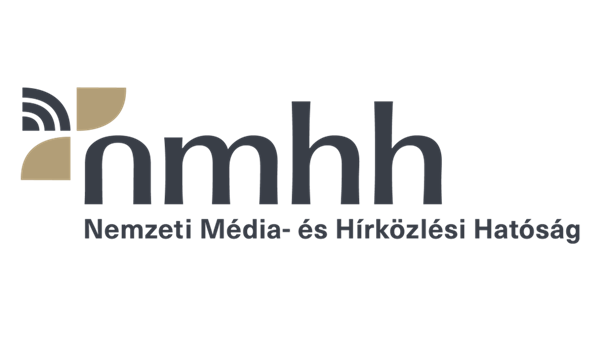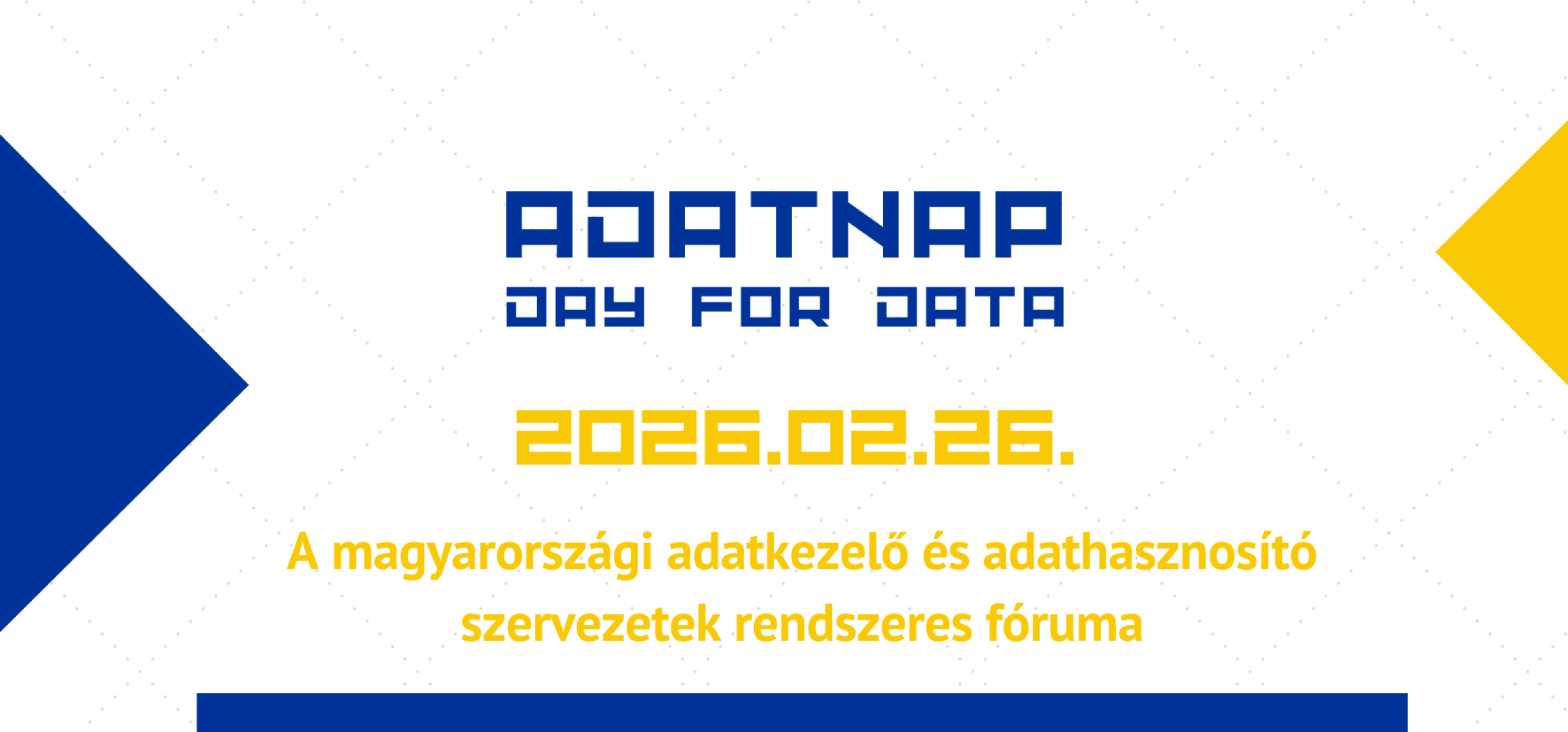a magyarországi adatkezelő és adathasznosító szervezetek rendszeres fóruma
Idén fókuszban:
>> az adatmenedzsment helyi szinten
Szakpolitikai háttér: “Digital Omnibus” - Új Európai Adatuniós Stratégia
![]() 2026. február 26. csütörtök 8:30-18.00 (töltse le a naptárba .ics)
2026. február 26. csütörtök 8:30-18.00 (töltse le a naptárba .ics)
![]()
Pázmány Péter Katolikus Egyetem, Jog- és Államtudományi Kar (1088 Budapest, Szentkirályi utca 28.)
Szent II. János Pál pápa Díszterem
![]() Az ADATNAP egy olyan - akadémiai és civil kezdeményezésre, éves rendszerességgel, immár harmadik alkalommal megrendezett - konferencia, ahol a magyar és európai adathasznosító szervezetek képviselői találkozhatnak. Ez a szakmai fórum lehetőséget biztosít az adatok kezelésével, menedzselésével, hasznosításával, illetve általában az adatokkal gazdálkodó állami és piaci szakmai szervezetek képviselői számára a párbeszédre, a kapcsolatépítésre és az információszerzésre. Célunk a 2024-ben indult szakmai dialógus kereteinek folyamatos fejlesztése, amely nemcsak egyéni, de társadalmi haszonnal is jár, és amely egy emberközpontú, élhető digitális jövő megteremtését szolgálja. 2026-ban is az ADATNAP kiemelt támogatója a Nemzeti Média és Hírközlési Hatóság.
Az ADATNAP egy olyan - akadémiai és civil kezdeményezésre, éves rendszerességgel, immár harmadik alkalommal megrendezett - konferencia, ahol a magyar és európai adathasznosító szervezetek képviselői találkozhatnak. Ez a szakmai fórum lehetőséget biztosít az adatok kezelésével, menedzselésével, hasznosításával, illetve általában az adatokkal gazdálkodó állami és piaci szakmai szervezetek képviselői számára a párbeszédre, a kapcsolatépítésre és az információszerzésre. Célunk a 2024-ben indult szakmai dialógus kereteinek folyamatos fejlesztése, amely nemcsak egyéni, de társadalmi haszonnal is jár, és amely egy emberközpontú, élhető digitális jövő megteremtését szolgálja. 2026-ban is az ADATNAP kiemelt támogatója a Nemzeti Média és Hírközlési Hatóság.
A rendezvény ingyenes, de regisztráció-köteles. Tisztelt Érdeklődők! Elértük a konferencia helyszínének befogadó kapacitását, ezért több regisztrációt sajnos nem tudunk elfogadni. Jó hírünk azonban, hogy a konferenciát élő közvetítésben követheti a Youtube csatornánkon.A
![]() Impulzív nyitó előadások
Impulzív nyitó előadások
Panelbeszélgetések, kérdések és fórum
tapasztalat-csere, információ-szerzés, kapcsolatépítés
PROGRAM
8:15 – 08:45
Érkezés, regisztráció
8:45 Nyitó szekció
Megnyitó: Dr. Komáromi László, PhD., Habil.
dékán, PPKE Jog- és Államtudományi Kar
Köszöntő és visszatekintés: Dr. Gerencsér Balázs, PhD., Habil.
az Ereky Kutatóközpont igazgatója, PPKE Jog- és Államtudományi Kar
Keynote: "Adat- és információmenedzsment 1000 éves hagyományokkal"
Dr. Lakatos Andor, Ph.D. történész, levéltáros, a Kalocsai Főegyházmegyei Levéltár vezetője (az előadás absztraktja)
Keynote: “Adatmenedzsment nagyvállalati szemmel”
Dr. Babos Gergely, Data Services Technical Tribe Lead, Chief Data Officer (CDO), OTP Bank Nyrt. (az előadás absztraktja)
9:40 Panel 1
Szakpolitikai háttér: új európai Adatuniós Stratégia - lehetséges válaszok tagállami és helyi szinten
- Dr. Tóth Andrea Katalin, PhD., LL.M. , Európai Bizottság, DG CNECT, Directorate for Data, igazgatói szakpolitikai asszisztens
- Ádám Dénes, Kommunikációs és Architekturális Igazgatóságot irányító elnökhelyettes, Központi Statisztikai Hivatal
- Dr. Vass Norbert, főosztályvezető, EDIB-tag, Nemzeti Adatvédelmi és Információszabadság Hatóság, Digitális Adatstratégia Főosztály
- Dr. Lapsánszky András, egyetemi tanár, elnökhelyettes, Nemzeti Média- és Hírközlési Hatóság
Moderátor: Gaál Barna, nemzetközi igazgató, Digitális Magyarország Ügynökség Zrt.
11:15 Panel 2
Téradatok (HVD) hasznosítása
Felvezető előadás: Egy nemzeti téradatpolitika megfogalmazásának fontossága
Hülber Attila, ügyvezető, Lechner Tudásközpont
- Hülber Attila, ügyvezető, Lechner Tudásközpont
- Sikolya Zsolt, adatpolitikai szakértő, Nemzeti Hírközlési és Informatikai Tanács
- Dr. Sík András, Ph.D. - Chief Geodata Officer, 4iG Zrt.
- HUNAGI Magyar Térinformatikai Társaság, t.b.c.
Moderátor: Dr. Sántha György, Ph.D., elnök, Magyary Zoltán E-közigazgatástudományi Egyesület
14:00 Panel 3
Adatmenedzsment, “önkormányzati best practices”-ek
Felvezető előadás: Case Study of Chanteloup-en-Brie
Olivier Colaisseau, Mayor of Chanteloup-en-Brie, France
Juhász Géza, igazgató, Lechner Tudásközpont
Vámos Krisztina, osztályvezető, Chief Data Officer (CDO), Budapest Városháza, Adatvagyon-gazdálkodási Osztály
Dancs László, városfejlesztési csoportvezető, EDC Debrecen Nonprofit Kft.
Horváth Zénó, Budapesti Közlekedési Központ
Moderátor: Dr. Varga Ádám, Ph.D., egyetemi docens (PPKE JÁK)
16:00 Panel 4
Standard szervezeti adatmenedzsment ciklusok a nagyobb szervezeteknél
Felvezető előadás: Adatmenedzsment “fejlettségi modell” bemutatása
Dr. Miskolczi Mátyás, Data Strategy Squad, Data Services Technical Tribe, OTP Bank Nyrt. (az előadás absztraktja)
- Dr. Kruchina Vince, Ph.D., ügyvezető, Nemzeti Adatvagyon Ügynökség Kft.
- Demjénné Gyöngy Judit, Stratégiai és adatirányítási vezető, Generali Biztosító Zrt.
- Szalai Gergely, Business Data Director, Graphisoft SE
- Ipacs László, igazgató, MNB Zrt., Statisztikai igazgatóság
- Gunyits Zakariás, Adatmenedzsment és Üzleti Intelligencia Vezető, MVM Group
Moderátor: Halász Gábor, elnök, DAMA Hungary, A CDO Fórum tagjainak képviseletében
![]() Mi az ADATNAP? Nézze meg az interjúkat!
Mi az ADATNAP? Nézze meg az interjúkat!
Absztraktok
Adat- és információmenedzsment 1000 éves hagyományokkal (Dr. Lakatos Andor)
Ebben az előadásban a régi adatokat őrző levéltárosok szempontjaival és az egyházi levéltárak világával találkozhatunk. A jelenkori adatkezelésben még elsősorban jogbiztosító jellegű dokumentumok ugyanis idővel történeti adatokká válnak, s ez az átalakulás érdekes folyamat, sok szempontból vizsgálható. Hogyan lesz az adatból forrás, mi a történeti érték, hogyan alakul, változik a történeti érdeklődés?
A levéltárakban őrzött források nagyrészt még nem digitális alapon születtek, vagyis biztosítanunk kell az "átjárást", terveznünk kell az analóg történeti adatok kezelését, feltárását a digitális csatornák számára. Hogyan határozhatók meg ennek a forrásfeltárásnak az alapvető lépései, módszerei? Hogyan egyeztethetők a szakmai szempontok és a társadalmi igények ebben a folyamatban? Milyen változásokat generál a digitalizáció a kutatóforgalomban? Hogyan illeszthető ebbe a folyamatba az adatvédelem, mitől és meddig lehetnek "érzékenyek" az adatok?
A kérdésfelvetéseken túl természetesen válaszokat is keresünk, s a feladatok meghatározásán túl eredményeket, működő projekteket is igyekszünk bemutatni.
(vissza)
Rend az adat káoszban…csak technológiai kérdés? (Dr. Babos Gergely)
A bankok „vagyona” évszázadokon keresztül fizikai formában létezett: aranyrudak és értékpapírok pihentek a trezorok mélyén. Az elmúlt évtizedekben ezt a szerepet fokozatosan átvették az informatikai rendszerek és az azokon tárolt adatok, majd az utóbbi tíz évben egy újabb minőségi ugrás következett be: a kritikus üzleti megoldások és adatok egyre nagyobb része felhős platformokra költözött. A vállalati „vagyon” ezzel fizikailag is eltűnt az alagsorokból, és más szervezetek adatközpontjaiban vált elérhetővé. Ez a változás nem csupán technológiai, hanem mély bizalmi kérdéseket is felvet: vajon valóban megvan-e az adatunk, jó helyen van-e, és akkor érjük-e el, amikor szükségünk van rá?
Az OTP Csoport digitális stratégiájának központi elemei a felhős platformokra épülő működés és az adat vezérelt döntéshozatal kialakítása. A felhőre való átállás azonban messze túlmutat az infrastruktúra cseréjén: új gondolkodásmód internalizálását, új képességek gyors kialakítását, valamint szabványok és jó gyakorlatok folyamatos fejlesztését igényli egy olyan környezetben, ahol kevés a bevált minta – sem vállalaton belül, sem piaci szinten.
Kiemelt kihívást jelent a kontroll újradefiniálása. A felhőben a biztonsági kontrollok más jellegűek, mint egy saját fizikai környezetben: az adatok olyan szintű titkosítása válik alapkövetelménnyé, amely még a szolgáltató számára sem teszi hozzáférhetővé az információkat. Ezzel párhuzamosan új pénzügyi kontrollmechanizmusokra van szükség a költségek átlátható és fenntartható kezeléséhez, például a FinOps szemlélet integrálásával a mindennapi működésbe.
A technológiai váltás együtt jár a működési modell, a szervezeti struktúra és a kompetenciák átalakításával is. Lehetőséget teremt a legacy rendszerek, adat- és szervezeti silók, valamint a technikai adósság felszámolására, miközben nagyobb transzparenciát hoz az adatfolyamatokban. Mindezt azonban jelentős időnyomás alatt kell megvalósítani, gyakran úgy, hogy az üzleti haszon rövid távon még nem számszerűsíthető, és a technológia maga is folyamatosan változik.
Az előadás bemutatja, miért válik a vezetői hit és elköteleződés kulcstényezővé egy ilyen transzformációban, hogyan lehet a változással szembeni természetes ellenállást kezelni, és miként tarthatók egyben a csapatok a hosszú úton. Szó lesz arról is, hogyan közelíthetők egymáshoz a fejlesztői csapatok, a biztonsági területek és az új pénzügyi szemléletek, valamint milyen gyakorlati eszközök segíthetik a felhős adat vezérelt működés fenntartható kialakítását.
(vissza)
Adatmenedzsment érettségi modell és felmérés (Dr. Miskolczi Mátyás)
Minden szervezet, vállalat egyedi – ez az adatmenedzsmentre ugyanúgy igaz, mint bármilyen más területre. Minden szervezet, vállalat hasonló – nagyon sok tekintetben, és ez is igaz az adatmenedzsmentre ugyanúgy, mint más területekre is.
Az adatmenedzsment tekintetében minden szervezet és vállalat hasonló, mégis egyedi fejlődési pályát jár be. Ami ezekben a pályákban közös, az az, hogy – magas szinten nézve – ugyanazokon a fejlődési szakaszokon megy keresztül, nagyon hasonló kihívásokkal néz szembe, valamint azokra hasonló válaszokat ad – még ha nem is pontosan ugyanolyat, mint bármelyik másik.
Adatmenedzsment érettségi modellből is sokfajta létezik, amik legalább abban hasonlítanak egymásra, hogy leegyszerűsítik a valóságot, mint azt minden modell tenni szokta. Az is közös bennük, hogy adnak egy „szamárvezetőt”, egy menetrendet, ami segít abban, hogy felmérjük, kb hol tart az adott szervezet saját magához képest.
Amiben sok esetben különbség van az érettségi modellek között, hogy mennyi segítséget adnak az aktuális kihívások leküzdésében és mennyire képesek előre jelezni, mik lesznek azok a jövőbeni kihívások, amikre épp ideje elkezdenünk felkészülni, hogy kisebb valószínűséggel érjen minket kellemetlen meglepetés.
A DAMA Hungary modellje azzal a szemlélettel készült, hogy segítse a használóját egy objektív diagnózis felállításában, valamint a küszöbön álló kihívások tekintetében is adjon iránymutatást. Emellett sok olyan jellemzője is van a modellnek, amiben nem ad támogatást: nem priorizálja a feladatokat és az egyes feladatok tekintetében a szükséges ráfordítást sem becsli meg helyettünk, továbbá – általános modell lévén – nem kezel iparági sajátosságokat. Ez utóbbi a modell továbbfejlesztési lehetőségei közé tartozik, csakúgy, mint a hozzá tartozó felmérési módszer gépi támogatása, amin a háttérben jelenleg is dolgozik az egyesület munkacsoportja.
A IV. panel bemutatása: Adatmenedzsment a gyakorlatban: A rendezett adatvagyon mint az intézményi stabilitás záloga (Halász Gábor)
A digitális átállás korában az adat mára ugyanolyan alapvető erőforrássá vált, mint a költségvetési források vagy a szakértői kapacitás. Éppen ezért az adatokkal való gazdálkodás nem pusztán technológiai kérdés, hanem egyértelműen stratégiai feladat. Míg a pénzügyi kontrolling vagy a személyügyi igazgatás több évszázados, kiforrott hivatali hagyományokra épül, az adatmenedzsment módszertanát – az adatok tudatos, rendszerezett kezelésének gyakorlatát – napjainkban közösen formáljuk.
A láthatatlan fundamentum: az adatok felhasználásra készen tartása
A szakmai diskurzusokban gyakran a látványos eredményekre, az elemzésekre és a döntéstámogató rendszerekre helyezzük a hangsúlyt. Fontos azonban kimondani: ezek csupán a jéghegy csúcsát jelentik. Az adatvagyon-gazdálkodás valódi motorja az adatmenedzsment – az a háttérben zajló, következetes munka, amely biztosítja az adatok folyamatos tisztaságát, hitelességét, dokumentáltságát és felhasználásra kész állapotát.
Ez a tevékenység jelentős erőforrást igényel, miközben eredménye a napi működésben kevésbé látványos, mint egy elkészült dashboard vagy riport. Mégis ez az a megkerülhetetlen alap, amely nélkül sem a digitális szolgáltatások, sem a mesterséges intelligenciára épülő kormányzati fejlesztések nem maradhatnak hosszú távon stabilak és működőképesek.
Változó környezet, közös kihívások
A feladat összetettségét növeli, hogy az adatok jellege és a technológiai lehetőségek gyorsabban változnak, mint ahogyan a szabályozási és szervezeti keretek alkalmazkodni tudnak. Különösen igaz ez a mesterséges intelligencia térnyerésére, amely alapjaiban alakítja át az adatkezeléssel szembeni elvárásokat. Ebben a folyamatosan alakuló környezetben a stabil, rendszerszintű alapok megteremtése jelenti az egyik legnagyobb kihívást.
Tapasztalatcsere a kerekasztalnál: közigazgatási és piaci tanulságok
Konferenciánk kerekasztal-beszélgetése az ország legjelentősebb adatvagyonát kezelő szakembereit hozza egy asztalhoz. A résztvevők között köszönthetjük a meghatározó, szabályozói szerepet is betöltő állami intézmények adatokért felelős vezetőit, valamint a versenyszféra azon szereplőit, akik úttörő munkát végeztek az adatmenedzsment rendszerszintű bevezetésében. A beszélgetés célja, hogy a különböző szektorokban felhalmozott tapasztalatokat közösen értelmezzük, és azonosítsuk azokat a pontokat, ahol a bevált gyakorlatok a közszolgálat javára fordíthatók.
A kerekasztal során többek között az alábbi kérdéseket járjuk körül:
A bevezetés stratégiája: Hol és hogyan érdemes elindítani az adatmenedzsmentet egy nagy, összetett szervezetben?
Szervezeti szövetségesek: Kik lehetnek a vezető legfontosabb partnerei, és milyen belső ellenállások kezelésére kell felkészülni a szemléletváltás során?
Szakmai útitervek: Milyen fejlődési szakaszokon mentek keresztül az intézmények, és melyek a következő mérföldkövek?
Az AI hatása: Hogyan alakítja át a mesterséges intelligencia az adatkezelési gyakorlatokat és a hosszú távú célokat?
A résztvevők nem elméleti modellekről, hanem a mindennapi működés során szerzett tapasztalatokról osztják meg gondolataikat, ezzel is hozzájárulva ahhoz, hogy a jelenlévők hatékonyabb válaszokat adhassanak saját intézményük adatgazdálkodási kihívásaira.
(vissza)
Korábbi Adatnap konferenciák programjai: 2024, 2025
Fő támogatónk:




